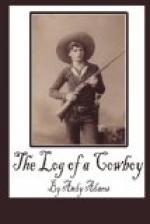The water in the river was not very clear, which called for a close inspection; but with a force of twenty-five men in the hunt, we covered island and shore rapidly in our search. It was about eight in the morning, and we had already searched half of the islands, when Joe Stallings and two of Scholar’s men swam to an island in the river which had a growth of small cottonwoods covering it, while on the upper end was a heavy lodgment of driftwood. John Officer, The Rebel, and I had taken the next island above, and as we were riding the shallows surrounding it we heard a shot in our rear that told us the body had been found. As we turned in the direction of the signal, Stallings was standing on a large driftwood log, and signaling. We started back to him, partly wading and partly swimming, while from both sides of the river men were swimming their horses for the brushy island. Our squad, on nearing the lower bar, was compelled to swim around the driftwood, and some twelve or fifteen men from either shore reached the scene before us. The body was lying face upward, in about eighteen inches of eddy water. Flood and Campbell waded out, and taking a lariat, fastened it around his chest under the arms. Then Flood, noticing I was riding my black, asked me to tow the body ashore. Forcing a passage through the driftwood, I took the loose end of the lariat and started for the north bank, the double outfit following. On reaching the shore, the body was carried out of the water by willing hands, and one of our outfit was sent to the wagon for a tarpaulin to be used as a stretcher.
Meanwhile, Campbell took possession of the drowned foreman’s watch, six-shooter, purse, and papers. The watch was as good as ruined, but the leather holster had shrunk and securely held the gun from being lost in the river. On the arrival of the tarpaulin, the body was laid upon it, and four mounted men, taking the four corners of the sheet, wrapped them on the pommels of their saddles and started for our wagon. When the corpse had been lowered to the ground at our camp, a look of inquiry passed from face to face which seemed to ask, “What next?” But the inquiry was answered a moment later by Black Jim Campbell, the friend of the dead man. Memory may have dimmed the lesser details of that Sunday morning on the North Platte, for over two decades have since gone, but his words and manliness have lived, not only in my mind, but in the memory of every other survivor of those present. “This accident,” said he in perfect composure, as he gazed into the calm, still face of his dead friend, “will impose on me a very sad duty. I expect to meet his mother some day. She will want to know everything. I must tell her the truth, and I’d hate to tell her we buried him like a dog, for she’s a Christian woman. And what makes it all the harder, I know that this is the third boy she has lost by drowning. Some of you may not have understood him, but among those papers which you saw me take from his pockets was a letter from his mother, in which she warned him to guard against just what has happened. Situated as we are, I’m going to ask you all to help me give him the best burial we can. No doubt it will be crude, but it will be some solace to her to know we did the best we could.”




